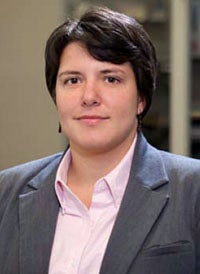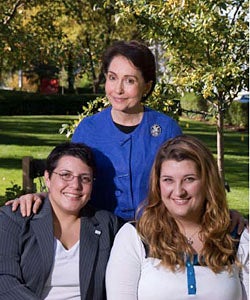Setting Kids Up for Success
Tracy Epp Devotes Her Career to Educational Justice
In the small rural community where she grew up, there was no guarantee that Tracy Epp would receive a quality education. In fact, the odds were against it. Her high school, she says, was not what you'd call "college focused." Of the 36 students in her graduating class, only two went on to earn a higher degree.
Today, Epp belongs to a generation of reformers who are determined to make equal educational opportunity a reality across the United States. A 1997 graduate of Case Western Reserve University, Epp is also an alumna of Teach for America (TFA), a program that recruits and trains recent college graduates to work in underperforming public schools. Three months after her commencement, Epp was teaching eighth-grade social studies in a low-income community in south Texas. By 2006, she had become the chief academic officer for the IDEA Public Schools, a growing network of charter schools in the Rio Grande Valley that she helped create.
Epp says that her mission is to "set kids up for success." She does this by providing them with resources that weren't available to her when she was in school—highly trained teachers, a college preparatory curriculum, robust academic support and counseling services. Sometimes, she admits, the students complain that their teachers demand too much of them, that the work is too hard. When this happens, she sits down with them and talks of the challenges that she faced as a first-generation college student. "They know," Epp says, "that I'm not just some adult trying to tell them what to do. They know I've been there with them."
Tracy Epp was one of six children of a Virginia farm couple. Her family, she says, was far from poor but not comfortably middle class, either. Looking back, she remembers feeling a "sense of inequity in the world." Her parents told her that "there were a lot of people who didn't have the things that even we had—and we didn't have a lot." Although she was living in what was said to be the post-civil rights era, she sensed that racism was still "pretty prevalent" in her part of the country.
"My goal was to go to law school," Epp recalls. "I really wanted to be a lawyer fighting for social justice."
But the path to her goal was anything but clear. Epp didn't think she could get into a top-ranked university, or succeed there if she were admitted. But after she enrolled in a less competitive college in North Carolina, she realized that she'd made a mistake. "My classes were just very easy," she says—in no way a preparation for law school.
Fortunately, one of her friends from home was now at the Cleveland Institute of Art and told her about Case Western Reserve University. Here, Epp thought, was a "smaller school with a great reputation," in a city where she already knew at least one person. She transferred at the start of her sophomore year and became a history and political science major.
It didn't take long for her to realize that she was now "in a different league" academically. Some of her classmates had gone to "country day schools outside Cleveland." Many had taken Advanced Placement (AP) courses that her high school hadn't offered. "I was a living example of the education gap," she says, "even though I was at this university." Her professors had high expectations and were accustomed to seeing them met.
During her third semester, Epp enrolled in a constitutional law course taught by Laura Y. Tartakoff, an adjunct associate professor of political science. The entire course, Tartakoff explained on the first day, would focus on the First Amendment and the case law governing the right to free speech. She handed out a syllabus with a forbidding list of readings and research assignments.
"During the first couple of classes, I was terrified of Laura," Epp recalls. "I thought, 'My gosh, I'm going to fail.'" But soon, she began to see Tartakoff as an intellectual role model.
"She was the first person I ever met who was, by every definition, a lifelong learner," Epp explains. "She just soaked up everything. She would come to class with clippings and clippings and clippings, from the Atlantic Monthly or the Wall Street Journal or the Washington Post—any kind of world news to integrate into the course work. She would even find books that she thought we should read, even if they weren't completely connected to the course. She wanted us to read those books just to learn another perspective. And that made me want to ask her questions constantly."
Like scores of students before and since, Epp visited Tartakoff in her Mather House office. At first, they went over Epp's papers and essay exams. "Laura gave me very specific comments on my writing—less about content and more about style," Epp recalls. "I wasn't expecting a political science professor to provide that kind of feedback. But then, in doing so, she became interested in me; she wanted to know my story. And because she was interested in who I was, she became a life mentor."
In her senior year, under Tartakoff's direction, Epp wrote a thesis about a school voucher program for low-income families in Cleveland. Because parents could use the vouchers to send their children to private religious schools, she found the program interesting "from a constitutional, church-state perspective." But in the course of her research, she started to think more broadly about the educational prospects of disadvantaged children.
It was then that a classmate showed her a flyer from Teach for America. "When I read the mission statement," Epp says, "I felt that I was called to do it. I thought, 'This is exactly what I'm looking for; I need this perspective to make change. Then I'll go to law school and fight for educational justice in the courthouse.'"
Epp practiced for her TFA interview in Tartakoff's office and planned a sample lesson on the separation of powers. When her acceptance letter arrived that spring, she learned that she had been assigned to a middle school in Weslaco, Texas. Until then, she had never traveled farther west than Cleveland.
An Educational Leader
Although TFA recruits complete a summer of intensive training and receive feedback from program directors once they enter the classroom, the obstacles they confront in their first year are legendary. "I struggled with establishing myself as the authority in the classroom," Epp recalls. "I came in thinking that I could be the cool, hip teacher. I wanted to be a teacher whose students loved history, but sometimes I got that confused with being a teacher that kids love. That's a significant distinction."
Then, in her second semester, she started to find her way. Along with the guidance of her TFA supervisor, she had the support of her principal and her fellow teachers—"veterans who were on point, who wanted to be teaching the kids who were hard to teach." In addition, Epp says, "I had the opportunity to coach middle and high school sports. It really gave me an 'in' to a different side of the kids, and to the community." She returned the next fall convinced she would have a "fantastic year," and she did. But even with this success, she was still planning on law school. During Christmas break, she began filling out applications and thinking about her personal statement.
The next week, though, as Epp was traveling with her high school athletes to an away game, a group of ninth graders who had been in her class the year before started talking about a lackluster history teacher. "They were frustrated with the teacher—frustrated with what they getting academically," Epp says. And at that moment, she felt as though everything she had tried to provide for those students had been washed away.
"The impact of a year of a bad teacher is life changing—life threatening—for the kids I was teaching," she explains. "And I thought, 'This is not a system of public education that guarantees success for kids from poor communities—for kids who can't afford a gap in their education.' That's when it clicked for me: 'There are a lot of lawyers out there. I need to be here. I need to be working on this system, establishing myself as an educational leader.'"
At the end of that school year, Epp became TFA's program director for the Rio Grande Valley, and later joined the national program team. Meanwhile, two of her TFA colleagues in Texas decided to open their own charter school, the IDEA Academy, for children in grades four through eight. Epp helped write the charter and joined the board of directors. In 2003, she became the founding principal of the first IDEA high school.
Today, as the system's chief academic officer, Epp oversees curriculum, instruction, and professional development in 10 schools, kindergarten through 12th grade, that serve 4,000 students. By 2011, IDEA will grow to 22 schools serving 15,000 students across south Texas.
A Vastly Different Life
In her days as a classroom teacher, Epp remembers putting in 70 to 80 hours a week. It is not so different now. "As educators, we work incredibly hard," she says. "It's easy to get burned out, and to lose sight of why we are doing this. But I know that my life is vastly different because I was able to go to college and be successful. And that's a source of inspiration for me. I know firsthand that the lives of our kids can be changed by the work that we're doing."
Last year, Epp heard that one of her graduating seniors, Maritza Smith, was applying to Case Western Reserve. On visits to the high school, she would meet Maritza for lunch and tell her about her alma mater. Before enrolling at IDEA, Maritza had spent two years at a large high school where she never got to know any of her teachers. But IDEA offered smaller classes and a more interactive style of instruction. "The teachers had cell phones," she says, "and if you had a question about your homework, you could call them at any time. There was literally no excuse for not getting your work done."
Maritza was already planning on college before she transferred to IDEA. "But I wasn't excited about it," she admits. "I was going to go because my mom was forcing me to go. When I went to IDEA and started learning about the opportunities, when I heard teachers say that you should invest in your education, then I wanted to better my life."
Maritza's high school graduating class was about the same size as Tracy Epp's—35 students. But every one of the IDEA students had been admitted to a four-year college or university. (At IDEA, a college acceptance letter is a graduation requirement.) And when Maritza heard that she had been admitted to Case Western Reserve and awarded a major scholarship, she was confident that she would thrive here.
She had taken "a lot of AP classes," Maritza explains. She had benefited from "the level of work that they gave us at IDEA, and the discipline that we have." And during one of their lunches, Epp told her that Laura Tartakoff was looking forward to meeting her.
"I heard she's a very good professor," Maritza says. "She knows what she's talking about."

Tracy Epp.
Photo: Johnny Quiroz
 On a recent visit to Cleveland, Tracy Epp was reunited with her undergraduate mentor, Laura Tartakoff (center), and her former student, Maritza Smith (right).
On a recent visit to Cleveland, Tracy Epp was reunited with her undergraduate mentor, Laura Tartakoff (center), and her former student, Maritza Smith (right).
Photo: Al Fuchs
